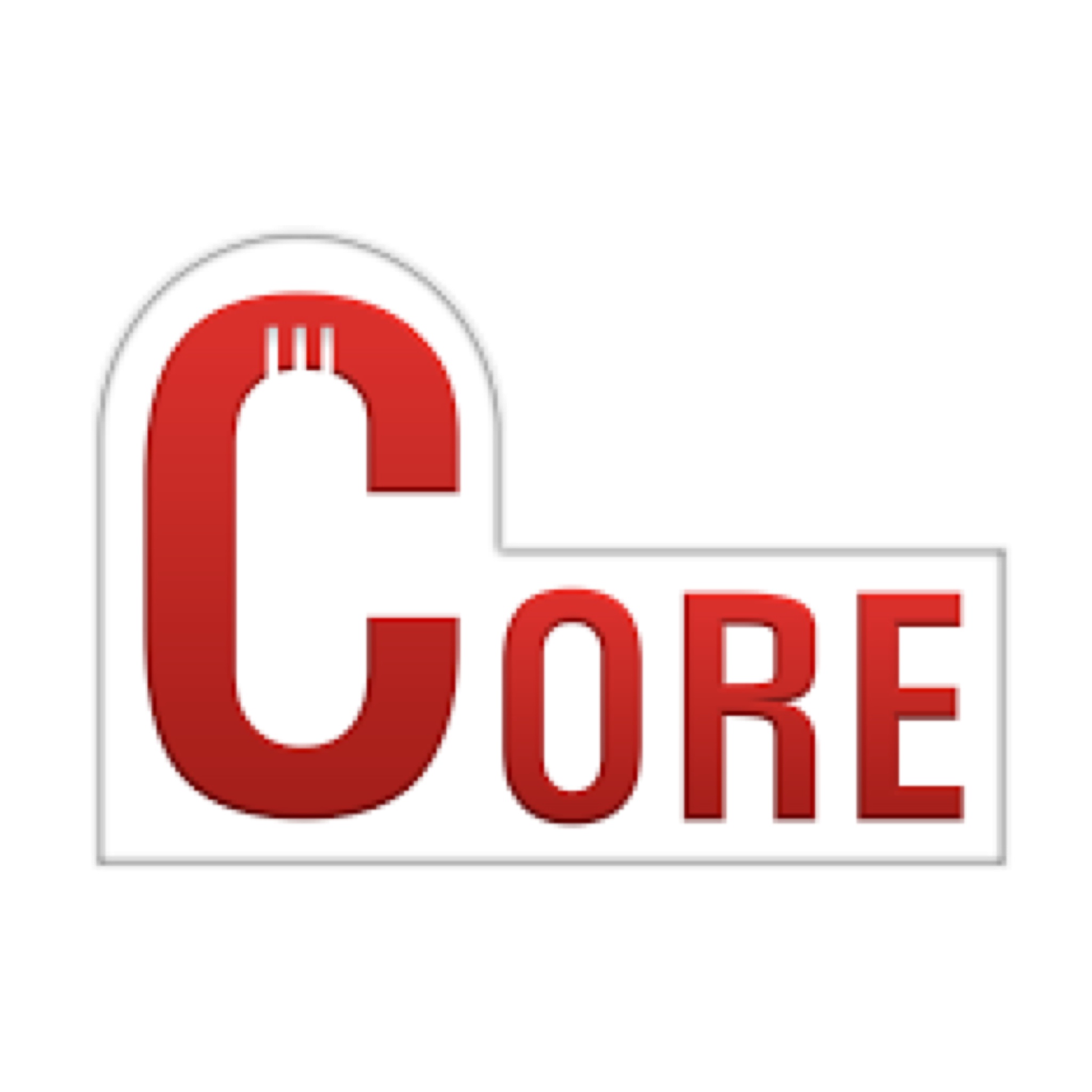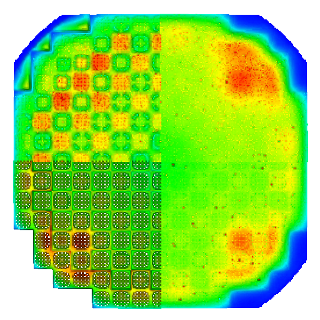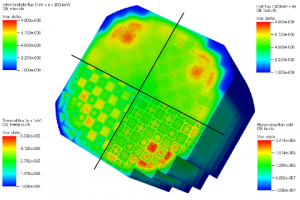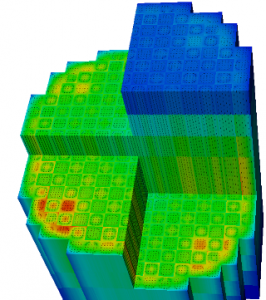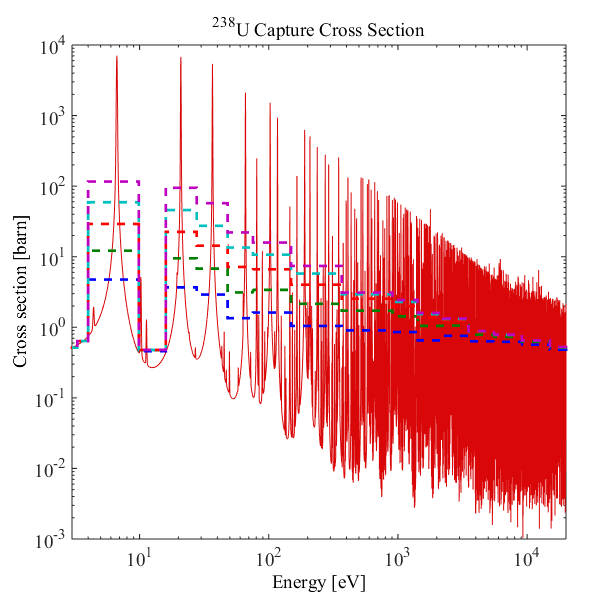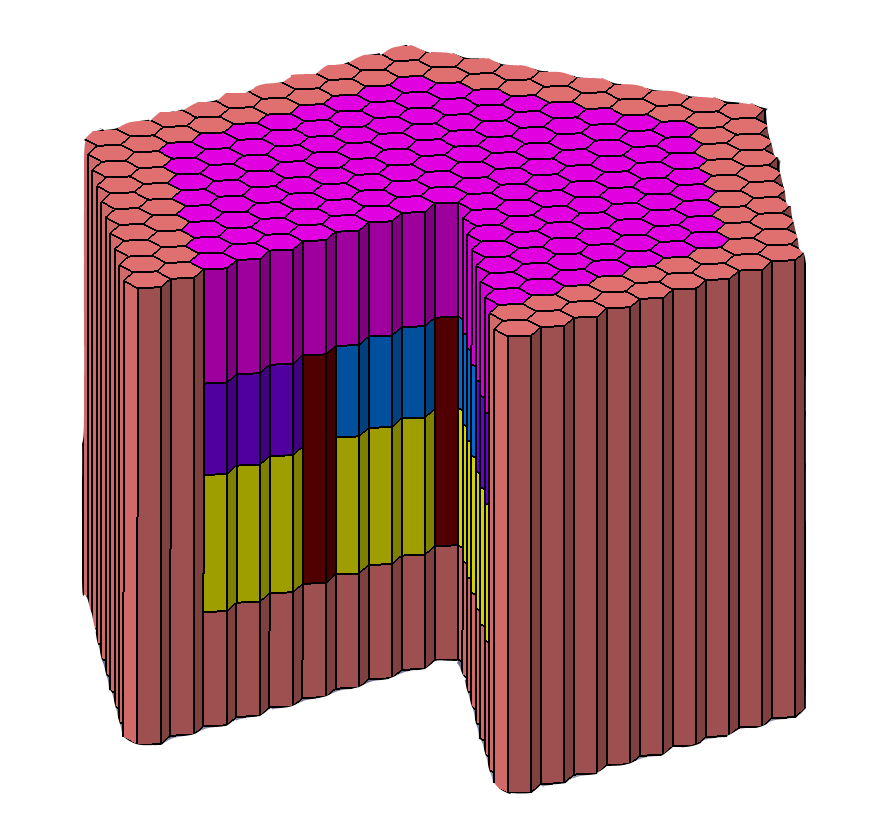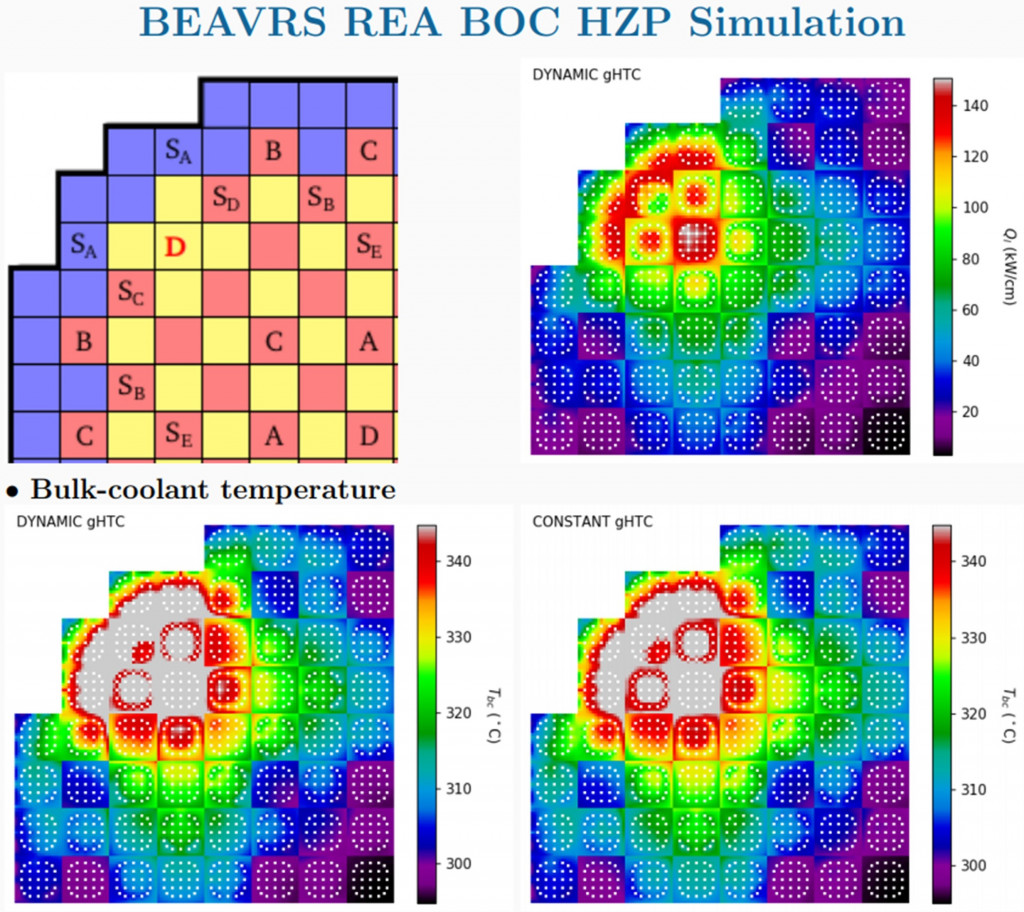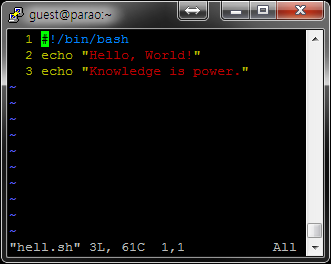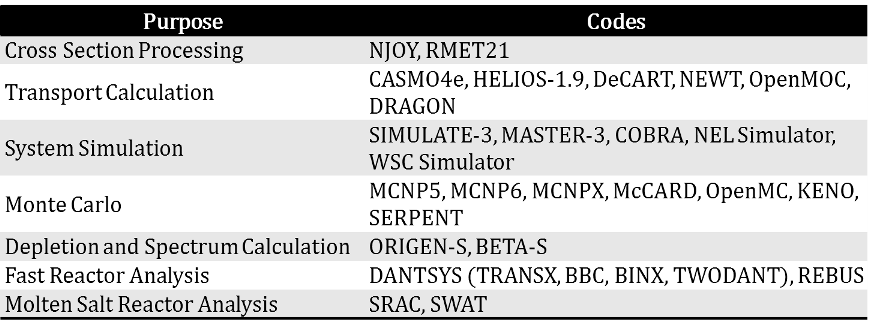Ongoing Research
- Development and Verification of Control Rod Depletion Module for Innovative SMR Design. Korea Nuclear Fuel Co., Ltd. (2023.11.06~2025.12.31)
- Development of multi-physics integrated platform for 3D reactor core validation and safety/performance analysis of i-SMR. Innovative Small Modular Reactor (2024.01.01~2028.12.31)
- Development and verification of the group constants generation method for prompt responding in-core SPND. Korea Nuclear Fuel Co., Ltd. (2024.02.23~2027.12.31)
- Development of Core Design with Flexible Operation and Core Protection and Monitoring System for i-SMR. Innovative Small Modular Reactor (2024.04.01~2028.12.31)
- Development of Base-Technology for LEU+/ATF Fuel and Core Application. National Research Foundation of Korea (2024.04.01~2026.12.31)
- Development and Coupling of Reactor Core Analysis Code, RAST-K, to NPP Simulator. Korea Hydro & Nuclear Power Co., Ltd. (2024.06.13~2026.09.30)
- Development of a core-integrated code (FAMILY) for safety regulation. Korea Institute of Nuclear Safety (2025.01.01~2025.12.31)
- Development of Optimal Flexible Operation Strategy of i-SMR smart Net-zero City. Pohang University of Science and Technology Industry-Academic Cooperation Group (2025.02.25~2028.02.24)
- Next-Generation Sodium-Cooled Fast Reactor Specialist Training Center. National Research Foundation of Korea (2025.05.01~2029.12.31)
- Development of Monte Carlo High-Reliability Core Analysis and Multiphysics Coupling Technology to Reduce Design Uncertainty for Small Modular Reactors. National Research Foundation of Korea (2025.04.01~2029.12.31)
Finished
- Development of World-Leading Full-Core Transport Numerical Reactor for Nuclear Design of Commercial Nuclear Power Plant (2019.04 – 2024.12)
- Localization of In-core Nuclear Instrument Signal Measurement System with High Performance and Prompt Response Instrumentation based Technology Development (2020.05 – 2023.04)
- Development of Key Technologies for Conceptual Design of Non-refueling Full-life Micro Reactor for Marine Applications (2019.04 – 2022.12)
- IAEA CRP on Neutronics Benchmark of CEFR Start-Up Tests (2018.04 – 2022.12)
- Development of operation supporting technology based on artificial intelligence for nuclear power plant start up and shutdown operation (2017.12 – 2022.11)
- Development of high-performance 3D multiphysics computer code for reactor transient analysis (2019.03 – 2022.02)
- Development of accident tolerance fuel utilization technology of integrated analysis platform (2020.01 – 2021.12)
- Development of Lead-cooled Fast Reactor Technology (2017.04 – 2021.12)
- Development of multi-physical safety analysis data compression code using PCA (2019.09 – 2021.08)
- Development of AI Based Reactor Core Diagnostics System (2019.06 – 2021.05)
- Evaluation of the rod-base core fuel characteristics for the high precision FFRD model (2020.08 – 2021.04)
- Development of Multicycle Optimal Core Design Technology based on Simulation Annealing Method (2019.03 – 2021.02)
- Development of High-Fidelity Multi-physics Computer Code Using Monte Carlo Method for PWR Analysis (2017.06 – 2020.05)
- Development of Advanced Super-Critical Water-cooled Reactor and the Dedicated High Performance Computer System (2015.01 – 2020.02)
- Establishment of a virtual-universial simulation platform for NPP systems (2018.02 – 2020.01)
- Optimization Evaluation System Development for High Burnup Spent Nuclear Fuel Transportation/Storage Casks (2018.06 – 2019.12)
- Safety evaluation system development for high burnup spent nuclear fuel Transportation/Storage casks (2018.07 – 2019.12)
- 크러드 침적 저감 피복관 및 미소셀 소결체 핵연료의 노심 핵적 특성 분석 (2018.09 – 2019.12)
- Development of High Performance Three-Dimensional Neutron Transport Analysis Code (2016.11 – 2019.10)
- Development and Coupling of Dynamic Reactor Core Nodal Computational Code and Nuclear Fuel Performance Analysis Code (2017.04 – 2019.09)
- Assesment of Neutron Transport Methodology for Fast Reactor Application (2018.05 – 2018.12)
- Development of Monitoring Equipment for Boron Concentration in Reactor Coolant (2015.09 – 2018.08)
- Development of Neutron Transport and Kinetics Codes for Boron Free SMR (2014.03 – 2018.04)
- Generation and Verification of Multi-group Cross Section Library of Lattice Physics Code for High Temperature (2017.02 – 2018.01)
- Development and Analysis of Experimental Model for the Verification of Prototype Sodium-cooled Fast Reactor (2017.05 – 2017.12)
- Depletion Benchmark Development for High-Fidelity Reactor Analysis (2014.12 – 2017.11)
- Development of High Performance Monte Carlo Computer System for Light Water Reactor Whole Core Analysis (2014.06 – 2017.05)
- Development of Advanced Long Life Small Modular Fast Reactor (2013.12 – 2016.11)
- Development of Big Data Based Demonstration Platform to Improve the Safety of NPP (2014.12 – 2016.11)
- Development of Resonance Treatment Method for VHTR Fuel (2015.03 – 2016.02)
- Accuracy Enhancement of Neutron Transport Analysis by Improving Energy Resonance Self-Shielding Methods (2012.06 – 2015.05)
- IAEA ADSR benchmark : kyoto university critical assembly – type A (2014.06 – 2015.05)
- Accuracy Enhancement of Neutron Transport Alaysis by Improving Energy Resonance Self-Shielding Methods (2013.06 – 2015.05)
- Establishment of Technology Supporting Foundations for Global Capability Enhancement of BOP in Nuclear Power Plants (2012.11 – 2015.04)
- Future Nuclear Human Resource Development by Attending Advanced Nuclear Summer Schools (2013.06 – 2014.05)
- Smart-grid based nuclear load-following operation technology (2011.06 – 2014.05)
- Development of Advanced Reactor Core Analysis Code Employing Fusion Technique of Probabilistic Method and Deterministic Method (2011.05 – 2014.04)
- Development of Ultra-long-life Core Fast Reactor (UCFR) Concept and Key Technology (2012.04 – 2014.03)
- Basic research for Th cycle MSR development (2013.03 – 2014.02)
- Summer School MeV, MIT NPS (2012.07 – 2013.05)
- Premium Power Plant Design Requirements and Safety Research (2012.04 – 2013.05)
- Feasibility Study of Daily Load Follow Operation for OPR1000 (2012.06 – 2013.02)
- Summer School MeV, FJOH (2011.07 – 2012.07)

